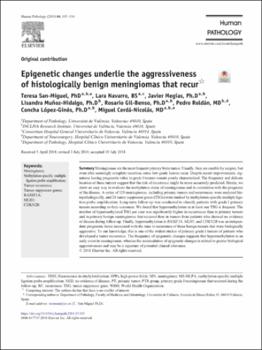Epigenetic changes underlie the aggressiveness of histologically benign meningiomas that recur
Fecha
2019Resumen
Meningiomas are the most frequent primary brain tumor. Usually, they are curable by surgery, but even after seemingly complete resection, some low-grade lesions recur. Despite recent improvements, signatures having prognostic value in grade I tumors remain poorly characterized. The frequency and delicate location of these tumors suggest that the risk of recurrence might be more accurately predicted. Herein, we show an easy way to evaluate the methylation status of meningiomas and its correlation with the prognosis of the disease. A series of 120 meningiomas, including primary tumors and recurrences, were analyzed histopathologically, and 24 tumor suppressor genes (TSGs) were studied by methylation-specific multiple ligation probe amplification. Long-term follow-up was conducted to classify patients with grade I primary tumors according to their outcomes. We found that hypermethylation in at least one TSG is frequent. The number of hypermethylated TSG per case was significantly higher in recurrences than in primary tumors and in primary benign meningiomas that recurred than in tumors from patients who showed no evidence of disease during follow-up. Finally, hypermethylation in RASSF1A, MLH1, and CDKN2B was an independent prognostic factor associated with the time to recurrence of these benign tumors that were biologically aggressive. To our knowledge, this is one of the widest studies of primary grade I tumors of patients who developed a tumor recurrence. The frequency of epigenetic changes suggests that hypermethylation is an early event in meningiomas, whereas the accumulation of epigenetic changes is related to greater biological aggressiveness and may be a signature of potential clinical relevance.




